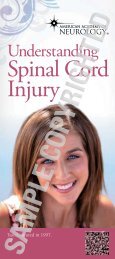Download the Parkinson's Disease brochure - American Academy of ...
Download the Parkinson's Disease brochure - American Academy of ...
Download the Parkinson's Disease brochure - American Academy of ...
- No tags were found...
Create successful ePaper yourself
Turn your PDF publications into a flip-book with our unique Google optimized e-Paper software.
UnderstandingParkinson’s<strong>Disease</strong>Todd, diagnosed in 2006.SAMPLE COPYRIGHTED
What Are <strong>the</strong> Symptoms?The main symptoms <strong>of</strong> PD are:• Rigidity, or stiffness, in arms and legs• Tremor that is <strong>of</strong>ten most noticeable when <strong>the</strong>affected limb is at rest• Poor balance and coordination• Bradykinesia, or slowness in starting movement,which may lead to less facial expression, changes inspeaking and voice quality, shuffling gait, smallerhandwriting, or trouble with fine finger movements,such as buttoning a shirtSymptoms vary from person to person. They usuallyappear gradually.How Is Parkinson’s <strong>Disease</strong> Diagnosed?No laboratory test or brain scan can definitivelydiagnose PD. Your physician will make a diagnosisbased on all <strong>of</strong> your symptoms and your neurologicexamination. It is vital to be diagnosed by a physicianexperienced in treating <strong>the</strong> disorder. Neurologists arephysicians who can make a diagnosis.Did you know?Neurologists are medical doctors who specializein disorders <strong>of</strong> <strong>the</strong> brain and nerves. They are<strong>the</strong> specialists who most <strong>of</strong>ten diagnose and treatpeople with PD.SAMPLE COPYRIGHTED
What Are <strong>the</strong> Treatment Options?Much research is currently focused on finding treatmentsthat slow or stop PD. Although no medication currentlyexists that can do this, treatments are available to helpyou maximize your functioning. The treatments availabletoday have been proven to relieve bo<strong>the</strong>rsome symptoms<strong>of</strong> <strong>the</strong> disease and improve everyday function. There is nostandard or “best” treatment for PD. People can have a range<strong>of</strong> symptoms. You will need to work with your neurologistto find <strong>the</strong> treatment that is <strong>the</strong> best fit for your needs.MedicationsNo currently available medication has been adequatelyproven to slow <strong>the</strong> progression <strong>of</strong> PD. But manymedications can control symptoms. A neurologist willprescribe medications to manage your symptoms, but itmay take time and patience to identify <strong>the</strong> medicine anddosage that works best for you. These medications includemilder drugs such as selegiline, rasagiline, and amantadine.More potent drugs include levodopa and <strong>the</strong> dopamineagonists, including pramipexole and ropinirole. Somemedicines are used in combination with levodopa. Theseinclude rasagiline, selegiline, entacapone, and tolcapone.Side effects can occur. They may include nausea, vomiting,and ligh<strong>the</strong>adedness. Restlessness, sleepiness, bad dreams,and hallucinations can also occur. Some drugs maycause changes in behavior, such as obsessive gambling orshopping. Changing <strong>the</strong> dosage or discontinuing certaindrugs usually improves <strong>the</strong>se side effects. Because PD canchange over time, it is important to have regular evaluationsso that medications can be adjusted to address changingsymptoms.Deep Brain StimulationThe main non-drug treatment for PD is deep brainstimulation. Tiny electrodes are surgically implanted in <strong>the</strong>brain. The electrodes are connected to a small control unitimplanted under <strong>the</strong> skin in <strong>the</strong> upper chest. Deep brainstimulation is an option for only about 10 percent to 20percent <strong>of</strong> people with PD. Your neurologist can tell you ifthis treatment might be helpful for you.SAMPLE COPYRIGHTED
For Family and FriendsPD takes a toll on <strong>the</strong> main caregiver, too. Theeffects can be both physically and emotionallyexhausting. If you are caring for a family memberor friend with PD, take care <strong>of</strong> yourself, aswell. Avoid <strong>the</strong> feeling that you have to do itall yourself. Get help from family, friends, andpr<strong>of</strong>essionals. There are many support groupsavailable for caregivers. See Resources fororganizations to contact.Help Us Cure Brain <strong>Disease</strong>Make a Donation to ResearchThe <strong>American</strong> Brain Foundation supports vitalresearch and education to discover causes, improvedtreatments, and cures for brain and o<strong>the</strong>r nervoussystem diseases. To learn more or to make a donationto support research, visit www.CureBrain<strong>Disease</strong>.org.Make Your Voice HeardTo keep research advancing toward future cures andtreatments for brain disease, it is important for peopleaffected by neurologic disorders to advocate for moreresearch funding. Contact your members <strong>of</strong> Congressand ask <strong>the</strong>m to support neurology research byincreasing funding for <strong>the</strong> National Institutes <strong>of</strong> Health(NIH). Look up your Congressional representatives atwww.senate.gov and www.house.gov. Your voice canmake a difference.Take Part in ResearchPeople are needed for clinical trials that can helpfind new treatments for neurologic disorders. Clinicaltrials are research studies. They help ensure that newdrugs are both safe and effective. Ask your neurologisthow to volunteer for a clinical trial. You can als<strong>of</strong>ind trials through patient organizations or <strong>the</strong><strong>American</strong> <strong>Academy</strong> <strong>of</strong> Neurology website atwww.aan.com/view/clinicaltrials.SAMPLE COPYRIGHTED
Resources<strong>American</strong> <strong>Academy</strong> <strong>of</strong> Neurologywww.aan.com/patients(800) 879-1960The <strong>American</strong> <strong>Academy</strong> <strong>of</strong> Neurology website for patientsand caregivers <strong>of</strong>fers a wealth <strong>of</strong> articles, information aboutevents and resources, and links to support groups, clinical trialinformation, and more.Neurology Now ® magazinewww.neurologynow.com(800) 879-1960Free magazine for patients and caregivers, courtesy <strong>of</strong> <strong>the</strong><strong>American</strong> <strong>Academy</strong> <strong>of</strong> Neurology. Stories about people livingwith neurologic disorders, <strong>the</strong> latest information on resourcesand treatments, and more.Navigating Life with Parkinson’s <strong>Disease</strong>A volume from <strong>the</strong> <strong>American</strong> <strong>Academy</strong> <strong>of</strong> Neurology’s NeurologyNow Books series published with Oxford University Pressis an in-depth resource for patients and caregivers living withParkinson’s disease. Published summer 2012.Parkinson’s <strong>Disease</strong>: A Guide for Patients and Familieswww.aan.com/patients(800) 879-1960Free DVD and guidebook from <strong>the</strong> Foundation for <strong>the</strong><strong>American</strong> <strong>Academy</strong> <strong>of</strong> Neurology for people who are newlydiagnosed.<strong>American</strong> Parkinson <strong>Disease</strong> Association, Inc.www.apdaparkinson.org(800) 223-2732The Michael J. Fox Foundation for Parkinson’s Researchwww.michaeljfox.org(800) 708-7644National Parkinson Foundation, Inc.www.parkinson.org(800) 4PD-INFO (473-4636)Parkinson’s Action Networkwww.parkinsonsaction.org(800) 850-4726Parkinson Alliancewww.parkinsonalliance.org(800) 579-8440Parkinson’s <strong>Disease</strong> Foundationwww.pdf.org(800) 457-6676WE MOVEwww.wemove.org(347) 843-6132SAMPLE COPYRIGHTED
www.aan.com(800) 879-1960The <strong>American</strong> <strong>Academy</strong> <strong>of</strong> Neurology, an association <strong>of</strong>25,000 neurologists and neuroscience pr<strong>of</strong>essionals, isdedicated to promoting <strong>the</strong> highest quality patient-centeredneurologic care. For more information about <strong>the</strong> <strong>American</strong><strong>Academy</strong> <strong>of</strong> Neurology, visit www.aan.com.Cover photo by Todd Bisch<strong>of</strong>f©2012 <strong>American</strong> <strong>Academy</strong> <strong>of</strong> Neurology InstituteSAMPLE COPYRIGHTED









